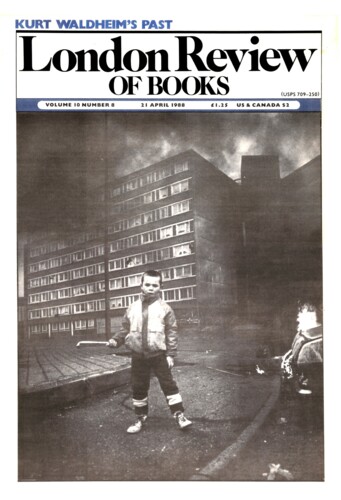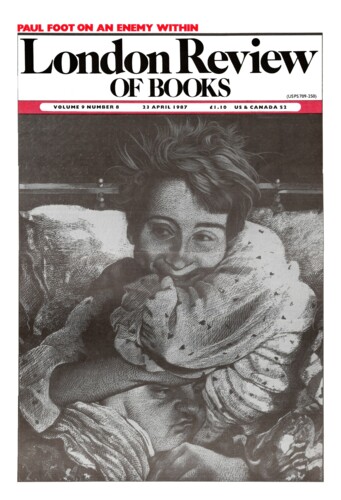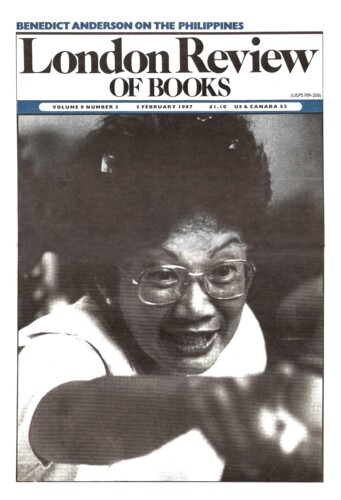Michael Dibdin
Michael Dibdin second novel, A Rich Full Death, came out last year. It was reviewed by Walter Nash (LRB, 18 December).
Diary: Ulster Questions
Michael Dibdin, 21 April 1988
‘What are you?’ As far as I remember, these were the first words ever spoken to me by an Ulsterman. Well, an Ulster child, actually. We would both have been about seven years old and it was my first day at school in the province. I’d previously attended a preparatory school in Cambridge and another in Dunfermline, but neither had prepared me for the question so abruptly shoved in my face that morning. In form it seemed grandiosely philosophical, a rhetorical gesture in the ‘What is the stars, Joxer?’ tradition. But the tone of voice – down-to-earth, menacing – belied that idea. I wasn’t sure what the question meant, but I was left in no doubt that the wrong answer would have unpleasant consequences.’
How to vanish
Michael Dibdin, 23 April 1987
‘To vanish from sight; be traceable no farther; cease to be present; be lost, especially without explanation.’ The verb in question normally behaves intransitively, but in Argentina after 1976 it learned to take a direct object as the military regime disappeared between nine and twenty thousand people. Humberto Costantini and Omar Rivabella both write about this, but their approach is so different that their books in fact complement each other.
Ghosts in the Machine
Michael Dibdin, 5 February 1987
How do you like to be approached by a strange work of fiction? Do you prefer a hearty handshake (‘Call me Ishmael’), a more discursive line (‘All happy families are alike’), or a low-key manner (‘For a long time I used to go to bed early’)? What about this, for example?
Pieces about Michael Dibdin in the LRB
Show us the night: Michael Dibdin
Michael Gorra, 26 November 1998
‘There is nothing new to be said ... but the old is better than any novelty. It would be a sad day indeed when there should be something new to say.’ Henry James’s fear that...
City of Dust
Julian Symons, 25 July 1991
What Carlyle called the Condition of England Question – in our day, the country created by Thatcher and her sub-lieutenants – is surely the ripest subject on offer to novelists. The...
Diamond Daggers
Stephen Wall, 28 June 1990
Death’s Darkest Face is Julian Symons’s 27th crime story, and its appearance coincides with an award (the Diamond Dagger) for his long service to the genre. This isn’t quite...
Interesting Fellows
Walter Nash, 4 May 1989
Take one housemaid, who interrupts you while you are making a ludicrously maladroit attempt to swaddle a stolen painting in brown paper. Fly into a sulk. Bundle the poor girl into your car, and...
Bloodbaths
John Sutherland, 21 April 1988
Stephen King has occasionally raised a rueful protest against being typed as a horror writer – even with the consolation of being the best-selling horror writer in the history of the world....
Cold Winds
Walter Nash, 18 December 1986
The narrator and protagonist of Answered Prayers is one P.B. Jones, failed writer and competent sexual athlete, a scurrilous charmer who – to lift a pithy phrase from the poet Martial...
Read anywhere with the London Review of Books app, available now from the App Store for Apple devices, Google Play for Android devices and Amazon for your Kindle Fire.
Sign up to our newsletter
For highlights from the latest issue, our archive and the blog, as well as news, events and exclusive promotions.



